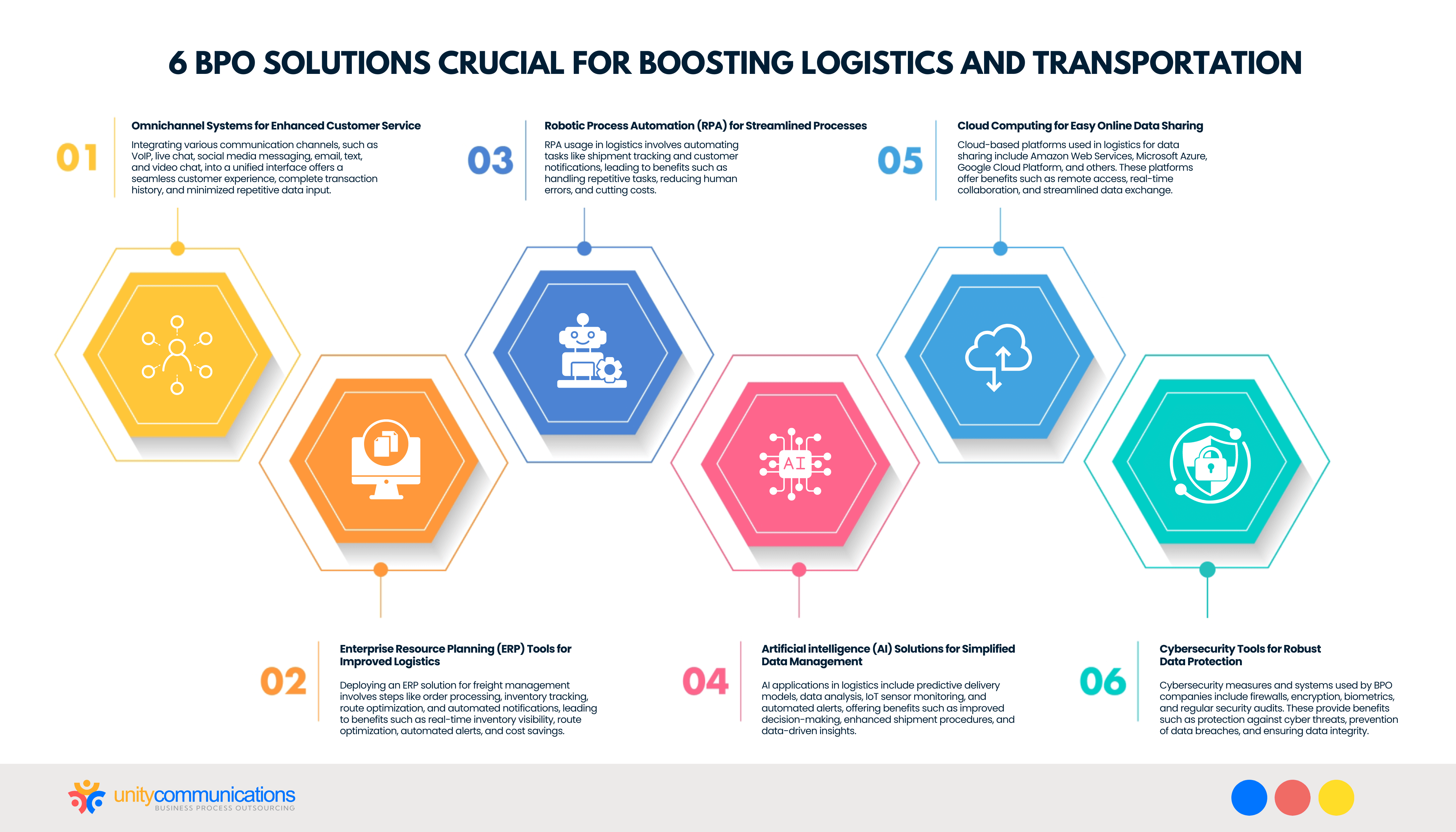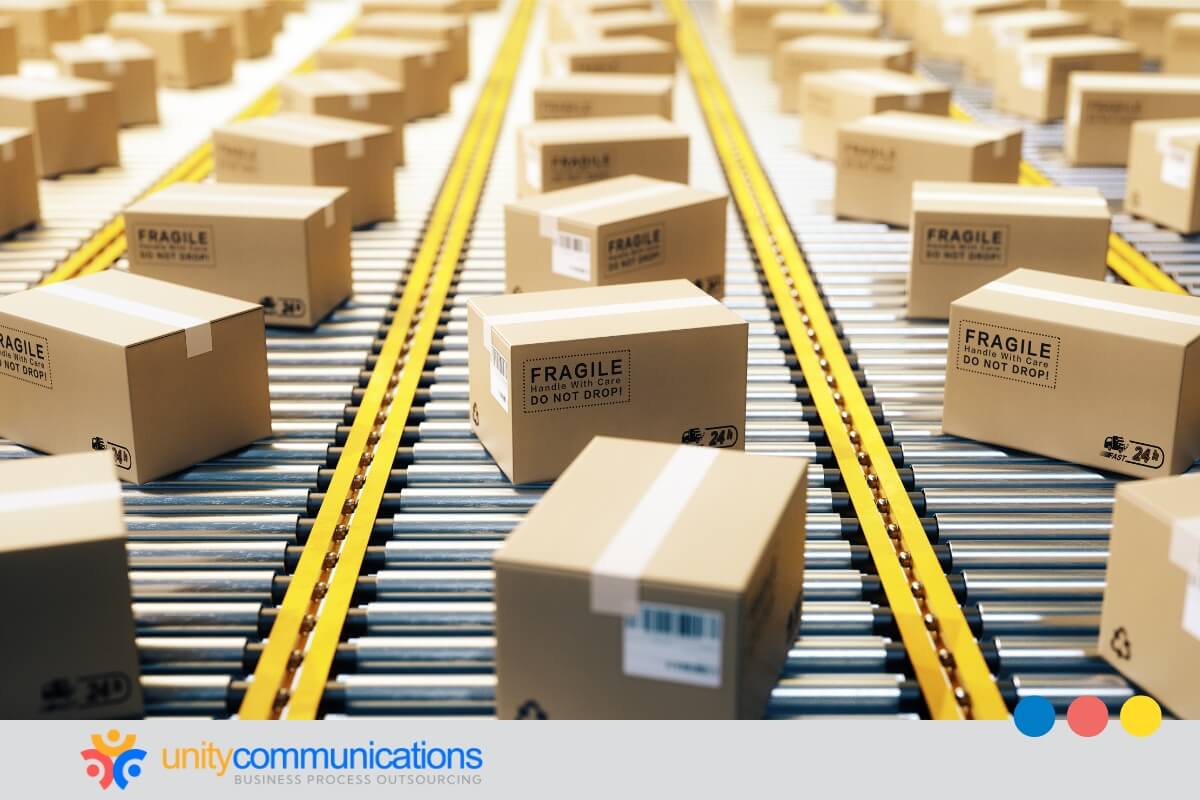IN THIS ARTICLE
Table of Contents
Distances shrink, and markets extend beyond borders in today’s interconnected world. A highway network, a bustling port, and a cargo plane-filled sky are all part of a network that allows the seamless distribution of goods globally.
But how do companies maintain undisrupted supply chain operations?
The answer is they employ business process outsourcing (BPO) services. Enterprises in the logistics and transportation sectors rely on this practice to reduce costs and increase efficiency. BPO companies use different solutions to streamline repetitive tasks while allowing clients to prioritize their core competencies.
Keep reading to learn how service providers optimize their cutting-edge systems to advance logistics business processes.
Six BPO Solutions Crucial to Boosting Logistics and Transportation

As goods trading requires faster and more cost-effective procedures, transportation and logistics companies constantly seek dynamic ways to adapt to the evolving market. BPO has become their go-to option to meet such a demand.
Service providers employ skilled workers proficient in using modern technologies to accomplish routine tasks quickly and efficiently. The following explains what BPO technologies are prevalent and how they are used in the fast-paced logistics industry.
1. Omnichannel Systems for Enhanced Customer Service
Logistics BPO providers optimize omnichannel systems to improve consumer care. These cloud-based platforms integrate all the communication channels below into a single interface, enabling a seamless customer experience.
- Voice over Internet Protocol (VoIP) call
- Live chat
- Social media messaging
- Text messaging
- Video chat
Omnichannel solutions allow third-party customer service representatives (CSRs) to track inquiries across channels without losing critical data. It lets them access the complete history of orders, interactions, shipments, and deliveries.
So, imagine a customer complaining about a delayed smartphone delivery via email. The CSR uses an omnichannel dashboard to see the customer’s previous transactions, ensuring a contextually relevant response.
If the customer later follows up via social media, the agent already knows the situation and the appropriate resolution. The CSR provides updates with consistent details. This action reinforces trust and enhances customer satisfaction.
Such continuity improves the quality of logistics functions. It also eliminates the need for customers to repeat information, which they favor the most. According to recent research, 92% of consumers will spend more with companies that do not require repetitive data input.
2. Enterprise Resource Planning (ERP) Tools for Improved Logistics
BPO providers use ERP tools to simplify logistics and transportation services. These automated systems feature a comprehensive framework to enhance supply chain management. This results in significant cost savings and streamlined logistics operations.
Here is a step-by-step scenario detailing how a provider can deploy an ERP solution to improve freight management.
- Receive and process a client’s order to transport goods across different regions.
- Achieve real-time visibility into inventory levels to check the availability of the goods.
- Plan and optimize the transport route based on distance and traffic.
- Identify the right vehicle for the shipment, considering capacity and fuel efficiency.
- Enable the GPS tracking of vehicles for real-time shipping updates.
- Send automatic notifications to clients about the status of their shipped orders.
- Generate reports regarding each stage of the transportation process.
- Track shipment costs such as fuel, tolls, and maintenance fees.
- Provide delivery confirmation and virtual proof.
- Review historical transaction data and areas for improvement for future shipments.
3. Robotic Process Automation (RPA) for Streamlined Processes
Picture this: a BPO provider accelerates shipment tracking to support a logistics client. The vendor deploys an RPA bot to monitor shipments and retrieve real-time location updates. So, if the bot detects a delay, it immediately notifies the affected customer via an automated email.
This situation demonstrates how crucial RPA is to advancing logistics BPO services. The tech handles repetitive tasks such as customer support and shipment tracking. It ensures consistent data input to minimize human errors and avoid the high cost of inaccuracies and delays.
In addition, statistics from 2022 show that 58% of customers use chatbots for simple inquiries. BPO companies can also optimize RPA to accommodate consumers who prefer self-service options. They utilize RPA to automate email support ticketing and responses.
4. Artificial Intelligence (AI) Solutions for Simplified Data Management
AI and BPO always go hand in hand when simplifying data management, especially for logistics and transportation companies. This emerging tech enables predictive delivery models to help third-party vendors forecast demand patterns and supply chain disruptions.
This way, service providers can guide clients in making smart decisions and improving shipment procedures. They also use AI algorithms to perform the following data-driven tasks:
- Optimize delivery routing and scheduling.
- Monitor data streams from vehicular Internet of Things (IoT) sensors.
- Send automated alerts to immediately resolve shipment anomalies.
- Analyze unstructured data such as customer emails and social media interactions.
- Examine surveillance camera images and videos for warehouse and cargo monitoring.
- Enable the cognitive document processing of invoices, bills, and customs forms.
- Implement data cleansing and enrichment.
- Generate automated reports based on key performance indicators (KPIs).
5. Cloud Computing for Easy Online Data Sharing
Cloud computing facilitates easy online data sharing between providers and their clients. From inventory records to shipment details, the listed cloud-based platforms aid BPO providers in streamlining the remote access and exchange of enormous logistics and transportation data.
- Amazon Web Services (AWS)
- Microsoft Azure
- Microsoft SharePoint Online
- Microsoft Power BI
- Google Cloud Platform (GCP)
- Google Drive
- Google Sheets
- BigQuery
- IBM Cloud Object Storage
- IBM Watson Studio
- Dropbox Business
- Microsoft OneDrive for Business
- Zoho Docs
- Citrix ShareFile
- Datto Workplace
These cloud solutions let third-party and in-house teams collaborate virtually on shared documents, spreadsheets, and presentations. Such real-time information sharing keeps them updated on orders, product supplies, shipments, and deliveries.
6. Cybersecurity Tools for Robust Data Protection
Logistics business outsourcing services involve confidential data, including financial accounts and personal details. This sensitive information is vulnerable to cyber threats and attacks if not adequately protected.
For example, Crane World Logistics encountered a data breach that affected 1,614 customers in Texas in December 2022. This incident compromised consumer names, addresses, and social security numbers. The breach allowed cybercriminals to commit identity theft and other frauds.
BPO companies thus use various robust cybersecurity tools and strategies to strengthen data protection. These solutions prevent unauthorized alterations that cause logistical errors, incorrect deliveries, and supply chain inefficiencies. Providers ensure the integrity of their clients’ logistics data by deploying the following cybersecurity measures and systems:
- Firewalls
- Intrusion and detection systems
- Data encryption
- Biometrics and multi-factor authentication
- Endpoint security
- Data storage and backup
- Anti-virus scanning and mitigation software
- Security information and event management tools
- Access controls and permissions
- Regular security audits
- Incident response plans
- File-sharing solutions
- Vulnerability assessment tools
- System updates and patching
The Bottom Line

BPO solutions are critical to simplifying complex logistics and transportation processes. Omnichannel and cloud solutions, for instance, enable seamless communication and collaboration between customers, service providers, and carriers.
Meanwhile, ERP, AI, and RPA tools accelerate supply chain management, from order processing to shipment tracking. By deploying cybersecurity solutions and strategies, vendors ensure all sensitive data, systems, and procedures are protected.
Let’s connect if you need a reliable service vendor to meet your daily logistics requirements. Unity Communications utilizes the advanced solutions discussed to help address your supply chain operations at competitive costs. The award-winning multinational BPO company also houses employees who expertly use those systems to complement your core competencies.





